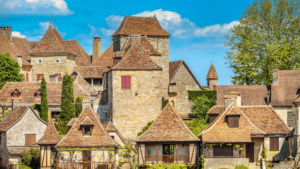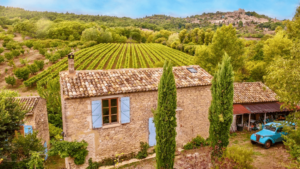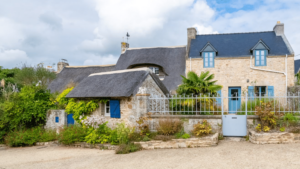By Karen Tait
Follow these simple steps to your dream home in France.

Lot Loubressac – Shutterstock – The property buying process in France is safe and well-regulated
1 Decide your area and budget
This may sound obvious but many people spend years visiting and researching different areas before they decide where to buy. Others fall in love with an area on holiday and decide to buy a second home there. If you’re making a full-time move, you’ll need to take into account more considerations such as access to work opportunities or year-round activities. Draw up a checklist of the amenities and attractions you want nearby – and remember, it’s easy to have your head turned by a bargain property but it may be cheap because it’s more remote than other more expensive houses, for instance.
Budget is probably a simpler decision – you can only afford what you can afford! That said, it’s not uncommon for people to decide on a figure and then when they can’t find exactly what they’re looking for, decide to stretch the budget a bit. Don’t forget to factor in buying costs, which include notaire’s fees and the various taxes collected by the notaire on behalf of the government, such as stamp duty, which together typically amount to around 8% of the sale price. Also mortgage fees (if applicable). The seller usually pays the agency fees.
2 Find a property to buy in France
Whether you’re searching ‘on the ground’ in France, looking in estate agents’ windows, for example, or searching online, you’ll have a wide selection of properties to choose from. Again, it’s a good idea to draw up a wishlist prioritising features you need and would like in a property. Don’t stick to it too rigidly though, as people often end up buying a property that’s quite different than the one they first had in mind!
In France properties tend to be advertised as T4 or F4 – that refers to the number of rooms other than the kitchen and bathroom; the advert may not specify how many bedrooms there are, for example.

Provence – Shutterstock – It’s worth doing your own research on property prices in the area of your choice
3 View properties
You may decide to choose one agent and get them to show you a selection of properties or make your own selection online and book appointments with more agents, however, always make sure you allow enough time for viewings. This means both the viewing itself and the time taken to travel between properties – it can be easy to underestimate this, especially on French country roads.
The agent will accompany you at the viewing (although since the pandemic they don’t travel in the car with you). Use the time to ask the agent lots of questions about the property and the area. It’s a good idea to take photos and notes, especially if you’re viewing multiple properties, as it’s easy to forget the details.
The agent may ask you to sign a ‘bon de visite’, a form which shows they were the first to present the property to you (so you can’t go direct to the seller and avoid agency fees).
The estate agency business in France is well-regulated and an agency must have a licence to do business, usually displayed in their office.
4 Make an offer
The agent can advise you on the price the seller will be willing to accept but do remember that they are acting on behalf of the seller. It’s worth doing your own market research on typical prices in the area, although it can be difficult to compare country properties. Valuations are influenced by many things including location, size, condition, distance from amenities or attractions, potential, desirable character features, views and so on – average prices per square metre can be misleading. Most properties are priced pretty accurately but there are always the exceptions.
5 Sign the sales contract
The contract usually takes the form of a ‘compromis de vente’ and is signed shortly after a price is agreed. Agencies often have their own standard contracts but it may be advisable to have your notaire draw it up, especially if you wish to include any clauses. Conditional clauses can be included (subject to the seller agreeing to them), such as the sale being dependent on planning permission for works you may wish to do or a successful survey. If you need a mortgage, this must be included in the contract.
A 10-day cooling-off period then follows, during which time the buyer (but not the seller) can pull out for any reason. After that, the contract is legally binding on both parties.
As the contract is signed early on in France, unlike in the UK, everyone knows where they stand and you can’t be gazumped or let down at the last minute.

Brittany – Shutterstock
6 Appoint a notaire
At this point, or before, that will need to appoint a notaire. Although similar to a UK solicitor they are empowered by the government to ensure sales are above board and that the various taxes are paid on completion – they must always be involved in property transactions in France. You can use the notaire already appointed by the buyer, or you can choose your own notaire, in which case they share the fees. You may also wish to take on an independent solicitor, experienced in cross-border property sales, especially if you want to seek advice on inheritance planning or other issues.
7 Pay the deposit
You will now need to pay the deposit, usually 10% of the sale price. If you pull out of the transaction, you will lose the deposit (and technically could be made to go ahead with the purchase although this is rare). If the seller pulls out, they must pay you back the deposit plus an extra amount equal to the deposit. As the deposit can represent a substantial amount, it’s worth looking into currency exchange at this point.
8 Get a survey done
Although structural surveys are not common in France, there are several British surveyors working in France. Alternatively, you might want to take a builder with you to view the property. The seller is required to provide a series of surveys called the ‘dossier de diagnostic technique’ or DDT– these cover drainage, electrical installations, energy use/carbon emissions, gas installations, natural risks (flood, earthquakes, land pollution etc) and the potential presence of the presence of asbestos, lead and termites (or other timber infestations).
9 Wait for the notaire to do the checks
It usually takes three or four months for completion to take place after the sales contract has been signed. During this time the notaire will do their checks, which includes the buey/seller’s rights to buy/sell the property, checking any third-party claims on the property or pre-emptive rights. Only the notaire is allowed to do property conveyancing in France.
10 Transfer the funds
Before completion, you will need to transfer the funds to the notaire, to ensure they are in place when you sign the final contract. However, you can exchange your pounds sterling for euros at any stage of the process. For example, you may wish to lock in an exchange rate early on, to ensure the actual price of the property doesn’t change due to fluctuations in the exchange rate. There are various options, including forward and stop contracts so seek advice from a specialist exchange company. They will invariably be cheaper than using your high street bank.
11 Completion
When it is time for completion you will be invited to an appointment at the notaire’s office to sign the final contract, the ‘acte de vente’, and for the notaire to oversee the transferring of the funds and payment of taxes and fees. If you can’t attend in person, you can appoint a power of attorney to sign for you (for example, the notaire’s clerk). The notaire reads out the terms of the contract to all parties and after signing, gives a copy of the contract to buyer and seller. The original deed will be kept by the notaire and/or mortgage registry. The property is now yours to enjoy!
Continue your househunting at the French Property Exhibition at the Novotel West, Hammersmith, London on 28-29 January where you can browse from hundreds of properties for sale, and attend free and informative seminars covering all aspects of buying in France. Register for free tickets
